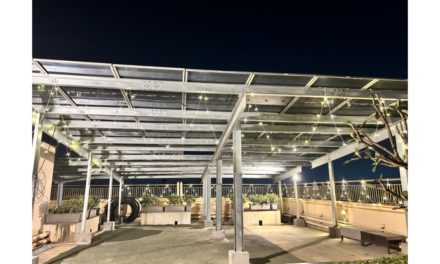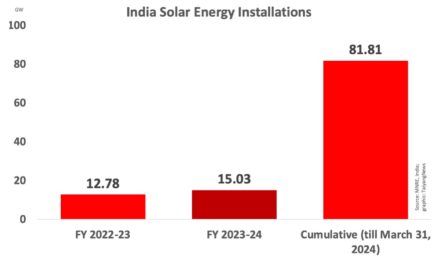- India has allocated a budget of INR 85 billion for grid-connected solar in its interim budget FY 2024-25
- The PM KUSUM Scheme has also secured INR 14.96 billion for next financial year, up from INR 11 billion in FY 2023-24
- Offshore wind will be encouraged with VGF for an initial capacity of 1 GW, according to the Finance Minister
Rooftop solarization of 10 million homes in India will enable them to obtain up to 300 units of free electricity/month, said Indian Finance Minister Nirmala Sitharaman as she tabled the country’s interim budget 2024-25 in the Parliament.
With free solar power generated and consumed on their own and excess sold to distribution companies, they can expect savings of INR 15,000 to INR 18,000 ($181 to $217)/year. It will also enable charging of electric vehicles, while generating entrepreneurship and job opportunities for youth with technical skills in manufacturing, installation and maintenance, she added.
Sitharaman was referring to Prime Minister Narendra Modi’s announcement of the Pradhanmantri Suryodaya Yojana last month to solarize 10 million low- and middle-income households (see Rooftop Solar Systems For 10 Million Homes In India).
The government has also allocated a budget of INR 85 billion ($1.02 billion) for grid-connected solar energy, up from the revised INR 47.57 billion ($574 million) for FY 2023-24.
For the government’s Prime Minister Kisan Urja Suraksha evam Utthaan Mahabhiyan (PM KUSUM) Scheme, the total budget in the next FY has gone up to INR 14.96 billion ($180.6 million). It will be an increase over INR 11 billion ($133 million) in FY 2023-24.
For the National Green Hydrogen Mission, the budget has allocated INR 6 billion for FY 2024-25, which is again an increase over the revised outlay of INR 1 billion ($12.1 million) in FY 2023-24.
The Finance Minister also announced viability gap funding (VGF) for an initial capacity of 1 GW for offshore wind. However, the overall budget for grid-connected wind power has been reduced to INR 8 billion in FY 2024-25. For FY 2023-24, the initial budget was INR 12.14 billion ($146.5 million), which was later revised down to INR 9.16 billion ($111 million).
The detailed break-up is available on the finance ministry’s website.
Since this was an interim budget, meaning it was presented in the year when general elections are due, there weren’t too many big announcements made. More clarity can be expected once the annual budget is announced by the new government in July 2024.
Industry response
Meanwhile, the solar industry has been reacting to the interim budget announcements. The National Solar Energy Federation of India (NSEFI) said the industry is bullish about domestic manufacturing, entrepreneurship, micro, medium and small enterprises (MSME) and jobs amidst the aggressive push for rooftop solar.
NSEFI CEO Subrahmanyam Pulipaka said, “This announcement of solarization of 1 crore houses will create a vibrant ecosystem for rooftop solar installers, vendors and technicians. NSEFI is about to launch a National Level database of skilled technicians who can be employed to install solar roof systems by vendors across the country.”
The association also plans to launch a virtual academy for training early career professionals for installation, inspection and operation.
Solar module manufacturing startup Grew Energy’s Director and CEO Vinay Thadani said, “The country is aiming at energy security in terms of availability, accessibility and affordability. The roof-top solarization scheme will enable up to 1 crore households to obtain up to 300 units of free electricity every month. As emerging solar manufacturers and EPC players, this announcement motivates us to increase our solar PV modules manufacturing as well as optimize EPC services.” The company recently announced plans to invest in 2.8 GW cell and manufacturing capacity in Gujarat (see India Solar PV News Snippets).
Solar-hybrid inverters, solar streetlights and electric vehicle (EV) company Servotech Power Systems Limited hailed the rooftop solarization scheme. Its Founder and Managing Director Raman Bhatia, “While we were anticipating updates on GST for solar products, we look forward to the detailed budget for further insights.”















